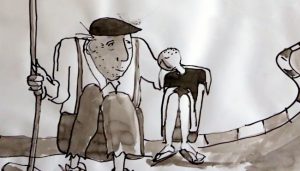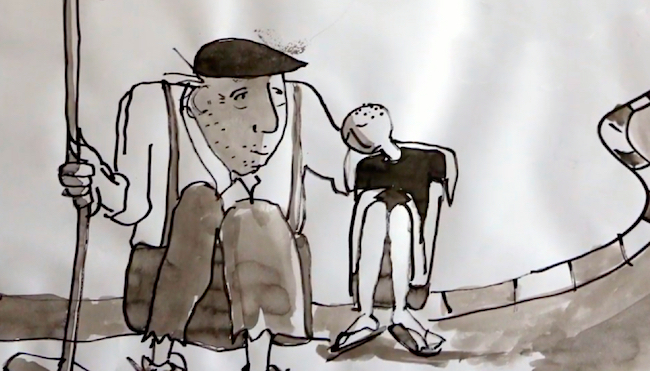 At the end of last week’s portion, Bereishis, we were introduced to Noah, the one man who found G-d’s favor in the debased generation of the flood. This week the portion opens, “These are the children of Noah” — but the Torah then elaborates on Noah’s personal qualities. “Noah was a righteous man, he was pure in his generation, Noah went with G-d.” After these praises about Noah, then and only then do we read that he fathered three sons: Shem, Cham, and Yafes. The Torah says it will introduce his children, and then talks about his character before doing that which it said it would. Isn’t that strange?
At the end of last week’s portion, Bereishis, we were introduced to Noah, the one man who found G-d’s favor in the debased generation of the flood. This week the portion opens, “These are the children of Noah” — but the Torah then elaborates on Noah’s personal qualities. “Noah was a righteous man, he was pure in his generation, Noah went with G-d.” After these praises about Noah, then and only then do we read that he fathered three sons: Shem, Cham, and Yafes. The Torah says it will introduce his children, and then talks about his character before doing that which it said it would. Isn’t that strange?
Rashi (Rabbi Shlomo Yitzchaki) writes that the narrative is ordered this way to teach us the value of good deeds. Noah’s personal righteousness and purity were considered his own children, and are therefore listed among his children. In fact, they are listed first, because Noah’s main progeny, and the progeny of all those who are truly spiritually accomplished, are their good deeds.
Parents love their children, and we can certainly expect the righteous will exhibit great love for them. A parent’s love for a child, however, is natural and expected. The few tragic exceptions to this are most often explained by other, severe emotional factors. The “norm” is to love and care for children. Love for good deeds, however, is unnatural — as we were created with a natural desire to be self-serving. It goes against our grain to be motivated by the service of others, even including service of G-d. The times we extend ourselves to others are therefore even more precious and valuable in G-d’s eyes.
After writing this, Providence struck and I was sent the following moving video with a story that brings this message across. I hope you will find it as meaningful as I did.





That was magical
Absolutely lovely
Now I begin to understand the reasons, one feels a special something, after doing someone else a favor.
Shabbat Shalom
I am a child of Holocaust survivor parents with numbers tattooed on their arms. I do not have any children. I try to have good deeds be my children. It’s at times a struggle but I try to persist and not get deterred by setbacks and despite of disappointments believe in basic goodness of people. My father, Pincas, lost his wife and three children in the camps but survived and married my mother, a survivor of Auschwitz, had me as his second family. He taught the love of nature and music and basic goodness and kindness.
How fortunate you were Milan that your father taught those values..
Your parents experiences in the camps, especially the murder of the children must have had a devastating effect on your father, and spilled over to you!!?
Be well and happy Your friend Fay
B”H
Dear Rabbi Dixler,
I would like to comment on the statements that “It goes against our grain to be motivated by the service of others, even including service of G-d. The times we extend ourselves to others are therefore even more precious and valuable in G-d’s eyes.”
My mitzvah involves supporting those with brain cancer, so I have some familiarity with neuroscience. One insight from neuroscience is just stunning. It turns out that a recent study found when we experience awe, the normal functions of certain portions of our brain are changed and those changes make us more pro-social and apt to help others. In others words, showing just how magnificently we are hard-wired by our Divine Designer, when we experience awe of God, we are more motivated to be of service to others.
Thought you might appreciate that insight.
Yes – thanks for sharing that very interesting piece of the puzzle!
The most profound insights are sometimes the simplest…reminiscent of Rabbi Nachman’s teachings.
The source of Eve’s betrayal answers, fully and completely, the nature of man. Did the serpent imbue Eve with the desire to disobey, or was the tendency always present? Thoughts?
Just wondering, was that song originally in Yiddish? The English phrasing seem a bit
awkward. Anyway, a very moving little story from Reb Shlomo Carlebach. Anyway, keep lighting up the darkness with these little gems.
Dad
Hi Dad, great to hear from you on the site!
I don’t think it was in Yiddish, but he may have been trying to preserve parts of the story just as Reb Shlomo said it over in its original form. Another theory is the awkward parts are there to draw attention.
Thanks again for stopping by Dad – Love, Mordechai
Just a reminder for me, as I stand into the mirror of our Torah.
Noach was a Tzedek in his early years. He endures all the corruption of man and women in the earth , 600 years of being righteous before G-d, his fellow Men and Women. His children .
Then , being so very gifted of G-d, a servant of G-d, he and his family are shut up in the ark by G-d himself. G-d’s gift to Noach for his Righteousness.
Then the very first thing Noach does , after the flood, he plants a Vineyard. A useless crop. What does it do for anyone.? Yah.
it produces grapes that produces a strong drink for him, and there he goes. He walks away from G-d as if G-d, blessed be he and Noach had never had relationship together.
In the beginning a Tzedek, in the end a mere man of the earth.
Then, as that’s not enough, Canaan enters his fathers tent sees his dad naked, either sodomizes him or castrates him, or both or one of the other. and there Noach goes, from revered Tzedek to a mere man of the earth.
All those righteous years meant nothing in the end.
Shalom.
Peter